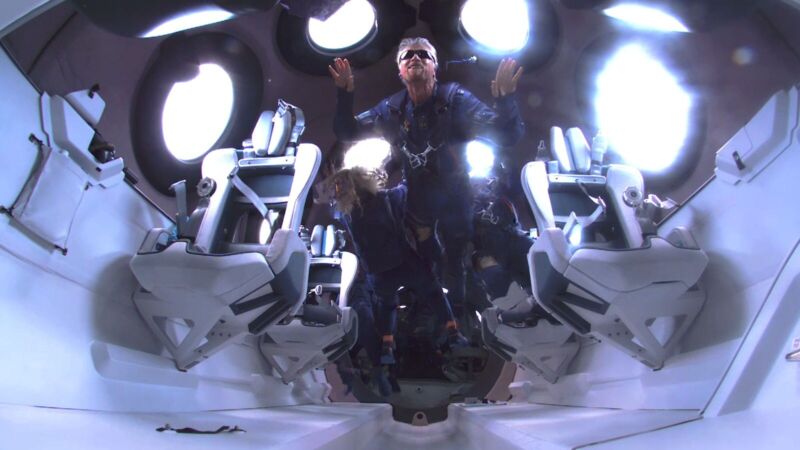
It has been 12 months to the day since Sir Richard Branson briefly departed this world, only to make a feathery return back to Earth, landing on a hot, dusty runway in rural New Mexico.
The flight marked a triumphant moment for Branson, who, just a week before turning 71 years old, fulfilled a childhood dream of going to space. In doing so, Branson beat fellow space-obsessed billionaire Jeff Bezos to the punch. The exuberance about his flight—and what it promised for Virgin Galactic—helped push his company's stock above $50 a share.
As Richard Branson went to space, he and his company seemed to be on top of the world.
But it has been a rough ride in the year since. Most crucially, Virgin Galactic's VSS Unity spaceship has yet to fly a single time again, and it may not do so until this winter. In the meantime, Bezos' space tourism company, Blue Origin, has started to regularly fly paying customers into space, higher than Virgin Galactic, on a fully reusable spacecraft. Partly as a result, Virgin Galactic's stock price has crashed, now trading at about $7 a share.
So one year after his historic flight, it's worth asking the question: Is Virgin Galactic a player in the space tourism race anymore? And if not, what does that mean for space tourism in the years ahead?
In retrospect
Some of the shine of Branson's July 11, 2021, flight has worn off. Several weeks after the spaceflight, it was revealed that VSS Unity flew outside its designated airspace for 1 minute and 41 seconds after being released by its carrier aircraft. This led the Federal Aviation Administration to ground the spacecraft before concluding at the end of September that the company needed better procedures and needed to communicate more closely with the FAA during flight operations.
Ultimately, this grounding had little effect because VSS Unity was simply not ready to fly. Originally, Virgin Galactic planned to fly its next mission, carrying officers from the Italian Air Force to space, late last summer or during the early fall. But in September, the company said the flight would not occur before mid-October due to a supplier issue.
"During preparation for the Unity 23 test flight, a third-party supplier recently flagged a potential manufacturing defect in a component of the flight control actuation system that they supply to Virgin Galactic," the company said in a statement. "At this point, it is not yet known whether the defect is present in the company’s vehicles and what, if any, repair work may be needed."
By mid-October, when this flight was due to take place, Virgin Galactic announced another reason for the delays. Actually, the company said, it now planned to begin an "enhancement program" for both the VSS Unity spaceship and its carrier aircraft, VMS Eve. In its public statements, Virgin Galactic was fairly vague about the work needed, but its comments about materials and flight margins were somewhat alarming.
This work has more or less progressed for nearly a year without another substantial update. The next flight, carrying the Italian Air Force officials, is now scheduled for no earlier than the fourth quarter of 2022, with commercial service—that is, starting to fly the hundreds of people who have purchased tickets—delayed until at least the first quarter of 2023.
"They've always overpromised and undelivered on their flight schedule, so I never expected their promised flight cadence," said Laura Forczyk, a space industry analyst. But the long delay between Branson's flight and a successor mission raises red flags, she said.
"Going a full year without even setting a date for their next flight is not a good sign," she said. "It leads me to conclude there really were serious structural or operational issues with Virgin Galactic's recent flights, despite their denial."
reader comments
358